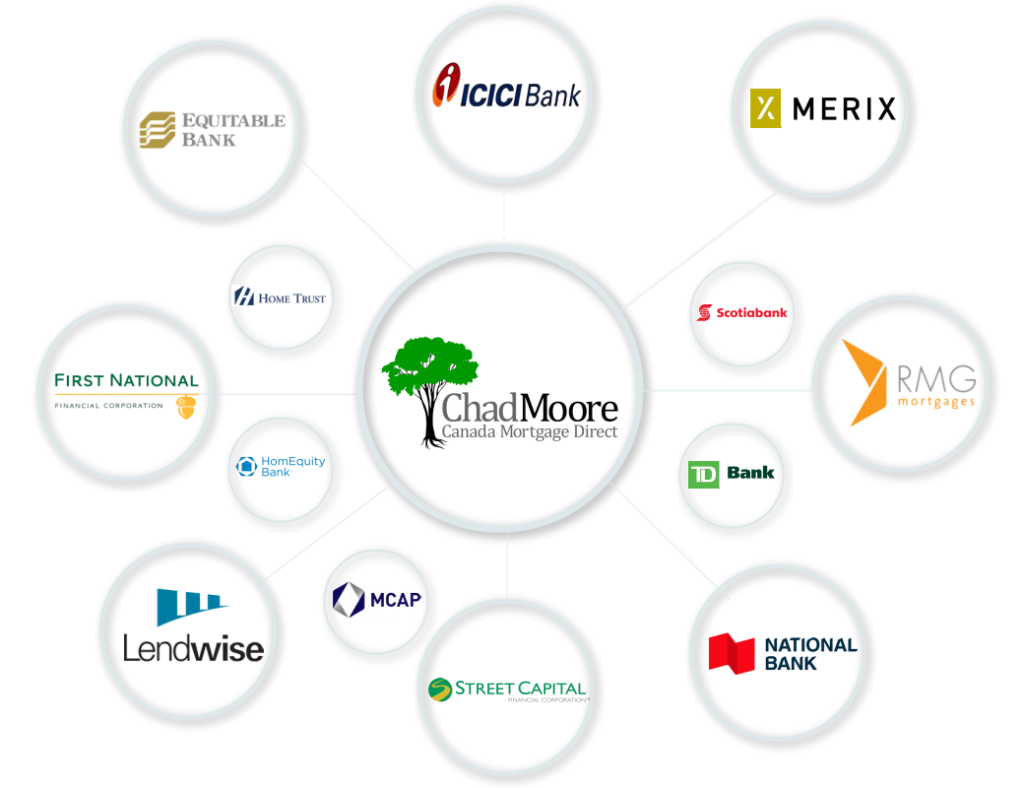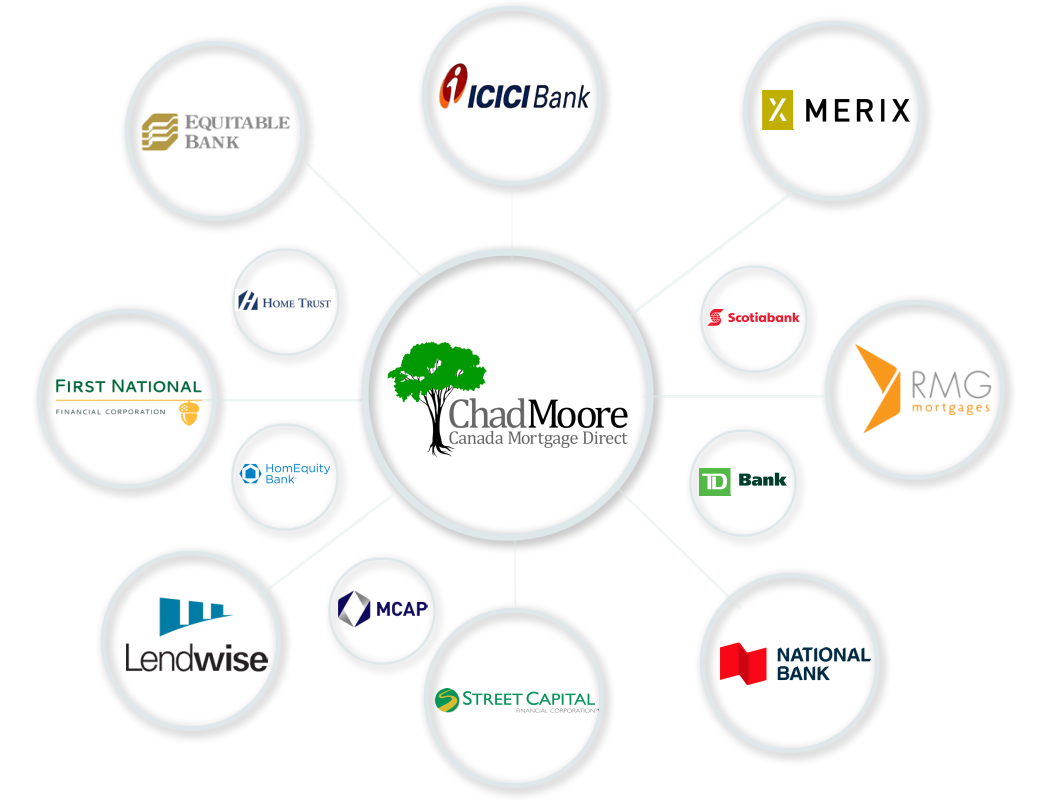I find this is a common question among first time home buyers who might be considering a Mortgage with a lender they have never heard of.
Branded Mortgage Lenders:
I have a tendency to trust Mortgage brands based on my recognition of the brand. I think this “trust building” is a primary focus of these institutions marketing plan.
Mortgage brands you might recognize: RBC, TD, CIBC, BMO, Scoitabank etc.
Side note: Honestly, I build trust with my clients as well through brand recognition. I primarily want my brand to build trust based on market education, product knowledge and Mortgage approval execution.
I associate brand recognition of big banks with stability, safety, confidence, and security. What do you associate recognizable Mortgage brands with?
Here is something I think is worth challenging. I think witnessing how I associate a large brand with [enter attribute here] is worth breaking down. I think seeing through the brand image and looking at the people within the brand might serve me better? I might question, who at the Bank do I know, like and trust? How did the branded bank actually earn my trust? Where did that trust come from?
Non Branded Mortgage Lenders:
In the Canadian Mortgage space there are non-branded Mortgage lenders. These non-branded lenders are very large financial institutions, with many of them operating across Canada. Some of them are publically traded on the Toronto Stock Exchange (TSX) too.
Many first time home buyers do not recognize these brands though. I’ve discovered without brand recognition there is a natural lack of trust with the thought of having one’s Mortgage with these institutions.
I find the biggest reason for people being hesitant with non-branded Mortgage lenders is asking …
What If The Mortgage Lender Goes Out Of Business?
Fair enough question.
Let’s be fair to both sides of the branded / non-branded Mortgage lender coin.
If I ask, “what happens if one of the non-branded Mortgage lenders goes out of business? What happens to my Mortgage?”
I think it’s also fair to ask, “what happens if a branded lender goes out of business”.
Fair? I might think RBC is too big to go out of business. And they are big. However, many Americans thought Lehman Brothers was “too big to fail”. But it did. Again, to be fair – let’s apply the same question to both sides of the coin.
So let’s unpackage this together by visiting my good friend, over simplified fundamentals.
Over Simplified Fundamentals:
Balance sheets state a household or business’s assets and liabilities. Fact.
My Mortgage is a liability on my household balance sheet.
My Mortgage is a asset on my Mortgage lenders balance sheet.
Ok, keep this in mind.
If a trucking company goes out of business, what happens to all the assets of that business [or what typically would happen]? The assets are purchased by another trucking company or business with a use for those assets.
If a Mortgage lender goes out of business [knowing the Mortgage is an asset on that lenders balance sheet] what happens? Another Mortgage company acquires those assets.
Real World Example:
Street Capital Bank of Canada was a non-branded Mortgage lender in the Canadian retail Mortgage space. I think they started back in 2008-2009.
In 2019 the Street Capital brand was purchased by RFA Mortgages. Assets [Mortgages] were transferred to RFA. Mortgage contracts were honoured. Branding was changed. Life moved forward.
Another common question comes up, when people are considering a non-branded Mortgage lender is asking where does the money come from?
Where Does The Money Come From?
When I think of a branded bank, and placing my Mortgage there, I don’t tend to question where money comes from for my Mortgage. I do have a tendency to question where a non-branded Mortgage lender gets their money from.
From here, I could take us down one of many, many rabbit holes. And we’ll go down these rabbit holes one day. Today, we keep things simple …
Non-branded Mortgage lenders are partnered with branded Mortgage lenders. *gasp!
It’s true. Let’s talk about it.
Each branded lender has their own internal staff that offer branded Mortgage products. Some branded lenders also have mobile Mortgage specialists to offer their products. Each of these employees are hired, trained, have managers, and other regular relational employer-employee engagements.
If a branded lender, partners with a non-branded lender, the branded lender can distribute their capital into the marketplace without the overhead of traditional employer-employee relationship.
For example, BMO and RMG & MCAP Mortgages have such a relationship. BMO leverages the non-branded Mortgage lender networks of independent Mortgage brokers (yours truly), who acquire clients, present Mortgage solutions and form relationships. BMO does not hire me, train me, manage my business, help me with annual planning, goal setting etc etc. RMG & MCAP also benefit as they pay employees, create profit for their shareholders etc.
Shameless Self Promotion:
An image is worth 1,000 words:

Conclusion:
I find large corporations market to create brand recognition. I have a tendency to extend trust of the brand to strangers who work for the brand.
When considering my Mortgage is hundreds of thousands of dollars, I think knowing the lender and having feelings of trust, security and stability are important for many buyers.
I hope this post is helpful in opening one’s mind about these thoughts and feelings toward branded Mortgage lenders. I also hope the reader starts to think about non-branded Mortgage lenders with more initial open mindedness.
I can help place your Mortgage at either a branded or non-branded Mortgage lender. However, I also help you understand the features and benefits of each lender. Guess what? I typically find non-branded Mortgage lenders are more favourable to their clients. Maybe there is a cost for convenience and perceived trust?
If you are planning to sell, purchase, renew or refinance your Mortgage, reach out 403-809-5447 or chad@canadamortgagedirect.com.
Talk soon,
Chad Moore
